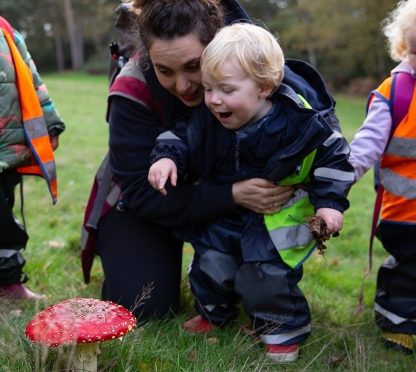Kate Smith, Bridget Steenkamp, Andrea Yankah and Donna Green share their experiences of developing their approach to early childhood education.
Following our 2023 conference - bringing together hundreds of educators from around the world - four early years setting leaders, students and researchers write about their own Froebelian journeys.
Finally Finding Froebel
Kate Smith is a a local authority Nursery Manager from Dumfries and Galloway, Scotland. In 2021 she completed the 'Froebel in Early Childhood Practice' course at The University of Edinburgh. She is currently leading a Froebel Trust funded project delivering family workshops focused on singing, relationships and early literacy skill development.
-
Finally, I have a name for what I feel in my bones and soul, my default setting. I am Froebelian.
Picture this. A young woman who knew from the moment her first day at school began that she wanted to be an educator, realises her dream.
Despite the challenges being a teenage mum would bring. Despite the struggle of returning to school full time soon after giving birth. Knowing that time traded with the baby was an investment in their future. Missing first steps, sacrificing milestones, working in the evenings to make ends meet… but this young mum is calm and reflective. She has always had a ‘way’ with young children, easily entertaining them with very little and helping them to make connections with their world. Her baby plays with a lovingly home-made sensory basket because she sees the value in that – but isn’t sure why? She’s not like the other mums. She sings to her baby, valuing every moment spent with him because his childhood really matters to her. As he grows, he learns when to ask her for help and she responds by offering him guidance. She allows him a strong voice. She nurtures and encourages his independence because she knows that’s important too, but can’t think why?
The dream is a university place studying to be a teacher. Her instinct draws her to a degree in early education. Here, she learns about pioneers - Montessori, Steiner, Froebel.
Froebel interests her because it’s who she connects with the most. She chooses him as the subject for her module assessment and then, after a couple of weeks of intense study and a good enough mark – He is gone.
Capped and gowned, this young mum begins her career. She realises quickly that she is different to the other teachers. This is more than a job to her; it’s a calling. She loves the children in her class. She deeply cares about their families. She becomes skilled in building strong supportive relationships with them all. Her display boards are empty of uniform artwork made to order. The other teachers judge her when she advocates holistic learning, but she endures their negativity because it just feels right. She loves her job, but never quite fits in.
Over time, her path takes her to Scotland and to a management role within a nursery. She finally has the autonomy to be herself.
A year later she is offered a place on a course.
Another course?
She wonders if she has the capacity for this.
It’s about Froebel.
She reconsiders.
She remembers learning about him at university 18 years ago – is he still even a ‘thing?’
One Saturday in February 2020, she travels an hour from home to the first session. It’s an early start and her mind is occupied with reflections of a demanding week at work. She wonders what she will truly get out of this. They begin to speak. Her interest is aroused. They are talking about Froebel’s life (they didn’t do much of that at university) They talk about his gifts. And his principles.
She can feel her heart beating in her chest. She glances at her colleague and friend who mouths to her ‘Kate, this is SO you!’ She looks around, no one else seems to be experiencing this palpable moment. Maybe it’s just happening to her. Sounds in the room begin to muffle and she can’t quite follow what is being said. She inhales deeply.
As I exhaled my hearing returned to normal and I was overcome by an awesome feeling of reason. And relief.
I had spent decades unable to make sense of who I was. Wondering why concepts that seemed so natural to me couldn’t be understood by others. The sniggering I heard when my baby’s favourite toy was a wooden spoon. The sadness I felt when the other teachers mocked me for taking learning outdoors - before it was popular. The continuous disapproval I suffered when I allowed the children in my class to play.
Finally, I had a name for what I was and what I had been for a long time.
Finally, I have a name for what I feel in my bones and soul, my default setting.
I am Froebelian.
-
Kate Smith, August 2022
Did you miss our 2023 conference?
Be inspired about a Froebelian approach to early education. Watch recordings of all this year's conference sessions. Available from April 2023.
Watch nowReflections of the Lily
Donna Green writes here about the 'Symbolic Representation of the Scottish, Falkirk Froebel Family Network Lily'. Donna is Early Years Pedagogue at Falkirk Council and the Falkirk Froebel Lead. She graduated with a MSc in Early Childhood Practice & Froebel from The University of Edinburgh in 2021. Donna led a Froebel Trust funded project introducing 'slow pedagogy' in three early years settings in Scotland in 2022.
-
Froebel wrote, “… seeking silent peacefulness of heart, harmony of life, clear purity of the soul, by the symbol of this silent pure simple lily”.
(Friedrich Froebel by Michaelis, E. and Moore, K. 2005: 1550).
When looking back at the start of our Falkirk Froebel Network's journey, the reflections and foundations had a strong desire to create a shared identity from newly certificated Froebelians within our community, to establish Unity and Connectedness. The peace lily was chosen as it linked to Froebel and other Froebelians whom we had learnt from.
The image symbolises the interconnections of what Froebel means to each of our Froebelians and communities, which was then collectively created.
Everything in the universe is connected. The more one is aware of this unity, the deeper the understanding of oneself, others, nature and the wider world...
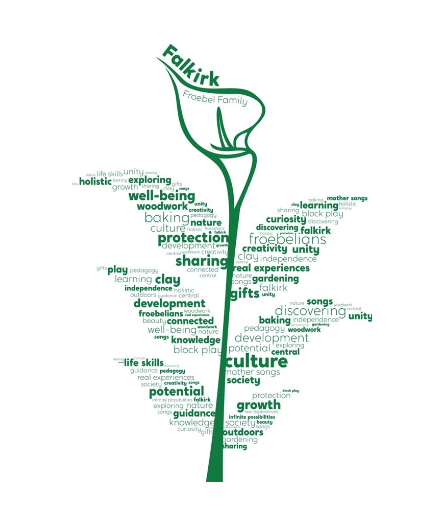
As time has progressed since creating our lily the importance of reflection continues to ensure it is meaningful, valued and lived in everyday life of early childhood. Froebelian Principles as articulated by the Froebel Trust enable a framework to support and guide in holistic and nurturing ways, where the concept of ‘Freedom with Guidance’ prevents rigidity and encourages individuality and humanity.
A recent reflection provoked aspiration to further explore the connection of the lily, as Bruce explains - Froebel “gave the metaphor of plants being symbolic of child development” (Bruce, 2021: 38) which interconnects with many of the Froebelian principles including engaging with nature.
The following poem is a symbolic piece of writing to express some thoughts of the lily through a form of everyday life exploration.
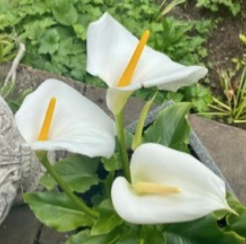
Our lived lily – I like to be me
I am a child
I have roots,
I am unique,
I grow with love and nurture
I am knowledgeable and curious to learn
I learn from doing things for myself, from other people, and places
I like to have freedom but also need guidance
I like people to recognise what I can do
I like to be creative and express ideas and opinions
I like to be me
I am a practitioner
I am unique
I have roots
I grow with love and nurture
I am knowledgeable and curious to learn
I learn from doing things for myself, from other people and places
I like to have freedom but also need guidance
I like people to recognise what I can do
I like to be creative and express ideas and opinions
I like to be me
I am family
I am unique
I have roots
I grow with love and nurture
I am knowledgeable and curious to learn
I learn from doing things for myself, from other people and places
I like to have freedom but also need guidance
I like people to recognise what I can do
I like to be creative and express ideas and opinions
I like to be me
We are equal: child, practitioner and family
Age does not define us, we are all important from pre- birth, throughout life, where Relationships truly Matter
I am a lily
I am unique: each lily like children and people are different
I have roots: each lily like children and people need to feel a sense of belonging to people and place
I grow with love and nurture: each lily like children and people flourish when nurtured and loved
I am knowledgeable: each lily like children and people have forms of beauty and knowledge
I learn from doing things for myself, from other people and places: each lily like children and people have personalised holistic ways of learning
I like to have freedom but also need guidance: each lily like children and people have freedom of space and time to unfold naturally, where observation and attuning supports in ways that’s right for me
I like people to recognise what I can do: each lily like children and people have many strengths and can be resilient in some challenging circumstances
I like to be creative and express ideas and opinions: each lily like children and people have autonomy to cultivate and grow where principles are at the root
I like to be me
-
Donna Green, August 2022
"...we must, like Froebel did, take an active stance as defenders of childhood..."
A love letter to freedom
Andrea Yankah shares "a letter to early childhood pedagogues all over the earth". Andrea is a Froebel Trust funded PhD student, based at the University of Roehampton, researching equitable practices in higher education.
-
I use the term pedagogue rather than practitioner because I have come to see the term practitioner as limiting and constraining, one who sometimes practices unconsciously in a predetermined manner. The term pedagogue to me speaks to something deeper, something internal. Like a soul calling. One who is always intentional in how they practice. Those who, as Froebel put it in his letter to one Madame Schmidt; those that have placed within them "a bodily and mental process and perpetuation of the human race, through childhood… [in their] heart and soul" (Froebel, 1840 cited in Michaelis and Moore, 1891, 156-7).
We are all very familiar with the many aspects of Froebel's work, but I feel there is not enough time given to the activism that Froebel did. We should remember that the main reason Froebelian ideas are so widespread is due to his followers took his ideas across the world when his kindergartens were banned. This was because his ideas were seen as opposing the political landscape at the time. If we are to continue to perpetuate the human race through childhood, and call ourselves Froebelians, we must, like Froebel did, take an active stance as defenders of childhood.
For decades, all positive change in the field of early childhood has happened because individuals have united for a cause. When I look out into the world and the direction in which early childhood policies and practices are moving in, I get worried. For a while now, we have churned out research about the importance of play and letting children have a childhood. The importance of teaching children that we are intrinsically connected with nature, if for nothing else but the survival of our very planet. The list is endless. It seems to me that these efforts have been ignored because they do not support the wider agenda in force. Like Froebel, it's time to take a stand. It's time to take active conscious steps towards creating ripples of change through our active pedagogues and rallying public support.
There is a deep duality throughout Froebel’s' writing, as he saw the importance of unity and separation of all things in achieving balance.
He stated:
"All true education in training and instruction should, therefore, at every moment, in every demand and regulation, be simultaneously double-sided—giving and taking, uniting and dividing, prescribing and following, active and passive, positive yet giving scope, firm and yielding; and the pupil should be similarly conditioned: but between the two, between educator and pupil, between request and obedience, there should invisibly rule a third something, to which educator and pupil are equally subject." (Froebel, 1886:14)
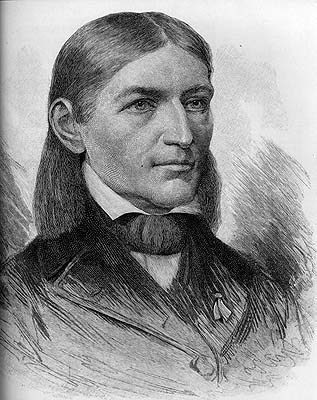
That duality is something we also wrestle with without really realising it. We wrestle with the types of environments and experiences our souls intuitively yearn to provide for children and the vast amount of policies that seek to constrain that. We wrestle with the competing, trying to get as many children enrolled to stay afloat, vs the need for us to unite as a sector for change to be realised. That unity is what I speak of. The thing that binds us together, the thing that invisibility rules us and what we are all subject to, is the perseveration of childhood.
I think there are some straightforward strategies we can adopt to drive the change we so desire. From everyday practice, all the way down to getting things together for a nationwide strike!
Developing and articulating active pedagogies
Every one of us started working with children for a plethora of reasons, some of which we may not even be consciously aware of. Just by looking at Froebel's own life experiences, you can see how all of his experiences have shaped his entire philosophy. I feel every practitioner should deeply consider their own "why" and seek to unite all the parts within their inner and outer self to enable them to engage in meaningful inter-actions with children and their families. We often find ourselves questioning our own 'professionality' due to the low status afforded to the sector. It is time to stand confidently as individuals, accepting that individually we have our own insights, our own work to do with children and shout this confidently from the rooftops. Learning how to communicate the complexities of our work, so if nothing else, our confidence in what we are doing is convincing enough that we know what we are doing. Our unedited individuality will help us to tackle issues from all angles together. If we do not do this, there will always be missing parts, we will never be whole, and our practice can never foster the whole child.
Engagement with parents and carers
Votes are the language in which politicians speak. For decades, we have engaged in our individual and collective acts of advocacy. If we united with parents and mobilised them in demanding reform, things would change quickly. We can discuss the beautiful complexities of Froebelian ideas and how parents can work with his philosophies at home. We can present real information to parents about the realities of what is happening, so we work with them to drive forward change. I believe many parents are hungry for something new. I believe many parents are aware of the need for play and the need to strike that balance between freedom and guidance on an intuitive level. Speaking directly to parents and their concerns can be a path to change.
Raising awareness of the Froebelian principles as a solution to issues
The rise of social media and how accessible information has become is a wonderful opportunity to raise awareness of Froebelian principles and how it so beautifully aligns with much of what both first educators (parents) and secondary educators (professionals) are looking for. A solution lies in Froebelian ideology, conversations around critical issues like climate change, the need to take care of the planet, sustainability, food and water scarcity, etc. Promoting his ideas via social media can be a way to begin to address many of the issues in the world today.
The freedom of childhood, for autonomy over our own lives, the freedom of fresh food and water, and the freedom to live and breathe freely on earth. So, pedagogue, what will you do in your practice for freedom?
-
Andrea Yankah, August 2022
Parents can be knowledgeable, nurturing educators.
Froebelian principles and home education
Bridget Steenkamp has worked as a children's pastor, a community social worker, a home educator, a storyteller and a childminder. Bridget is currently studying for a Doctorate in Theology at the University of Roehampton.
-
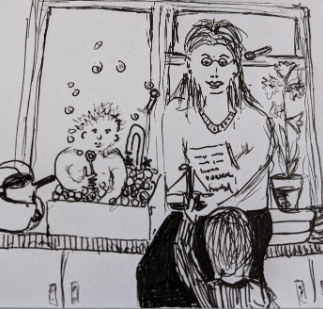
“I write this sitting in the kitchen sink”(Smith, 1948, p. 1).
They say that holidays with small children are just washing up with a different view. This is my experience home educating small people through early and middle childhood. Parents can be knowledgeable, nurturing educators. As a parent I felt I knew my young children better than anyone else. Could I facilitate child-led learning that had play at its heart?
The dishes were never done, no matter whether I was at home or elsewhere. The kitchen sink was often used for educational experiments such as a helpful toddler mindfully washing up all the individual, left-over, cold, twirly, pasta pieces. Occasionally, a small baby occupied the sink, engaging in wet play. One hand steadied the baby while the other jotted notes for our home educational journal. The kitchen sink sporadically provided well-washed items for a toddler’s treasure basket. My home education friends, and I would take turns perched on each other’s sink counter tops, ignoring the chores, as we discussed the merits of free play, unit study approach, good books, balancing freedom and guidance and autonomous learning. Bought curricula or educational books that suggest the busy type of educational structure, chopped into little sound bites, moving from one unrelated topic to the next left me cold and anxious.
Most of our home education happened outdoors where we often engaged in hands on projects. The local home educators from a wide variety of backgrounds would gather on joyful educational outings. What we shared in common was the notion that:
- education should be for all
- it should be meaningful and connected
- relationships with people from mixed age groups and backgrounds are preferable
- we all have a story to tell and our own unique shorthand of symbols and rituals that make up healthy family life can enrich one other
- leaving home and being outdoors was often the best part of our day
- we all observed the benefits of sustained free play.
I now realise on reading the Froebelian principles that I was already Froebelian in my approach. How I wish I had had the free poster from the Froebel Trust. It would have reminded me not to be chained to the kitchen sink.
We built dens, lit fires, shared stories, sang and made mud pies. New skills like drumming, making pigments for painting while learning to navigate relationships in various settings were mastered. On days when the sink was full of dishes, shouting out my inability to be a good home-keeper, I felt like Mrs Large, the elephant in the book 'Five Minutes Peace' by Jill Murphy. We would all land up in the bath together as sink was just too small for us all to be able to join in (Murphy, 2016).
I on difficult days would self-soothe, singing the closing lines of the poem ‘So quiet down cobwebs, dust go to sleep, I’m rocking my baby. Babies don’t keep’(Hamilton, 1958). Brief notes were scribbled, trying to prove that full-time education had successfully taken place. Initially I was worried about having to argue for the value of play.
Looking back
I shouldn’t have worried even though the dishes were undone. The children were pleased to be able to control the camcorder and film their own work and play. An elderly friend popped round for tea just at the time ‘the local authority inspection’ was due to take place. Homemade cookies, tea and some light entertainment in the form of the short video the children had made for absent grandparents did the trick. The sink full of dishes was ignored until needed. Our children grew up to be creative, independent learners who chose to study at Russell group universities and are successful, happy adults. We have all continued our separate journeys of autonomous learning, now only meeting on high days and holidays to fill the kitchen with chatter and the sink with dishes. I could not survive without knowing that there was a kinder way to educate that is Froebelian through and through. Tina Bruce points out a Froebelian view that ‘…education is part of life and that this is so throughout life’(Bruce, 2021, p. 4). Our lifelong educational journey continues.
Thanks goes to ‘my village’ that helped me raise young children:
- a great home education network (thank you Joan, Angela, Jan, Charlotte, and Betsy)
- a mutually supportive mum and toddler group
- patient librarians
- good friends
- a loving partner
- home education books full of Froebelian ideas
- a church that actively welcomed noisy babies and busy toddlers
- adult children who still own their play
- and autonomous learning.
Nothing in life is perfect but sometimes one can find synergy writing ‘in the kitchen sink’.
References
Bruce, T. (2021) Friedrich Froebel: a critical introduction to key themes and debates. London ; New York: Bloomsbury Academic.
Hamilton, R. (1958) ‘Song for a Fifth Child (Babies Don’t Keep)’, Ladies’ Home Journal.
Murphy, J. (2016) Five minutes’ peace: celebrating 30 years of the Large Family.
Smith, D. and Grove, V. (2011, first published 1948) I Capture The Castle.
-
Bridget Steenkamp, August 2022
-
The authors created these short articles about their Froebelian experiences of working with children and families during the Froebel Trust's Writing Workshop held in Summer 2022.
Listen to our podcast
A series for anyone interested in finding out what a Froebelian approach to early education is all about.
Learn more